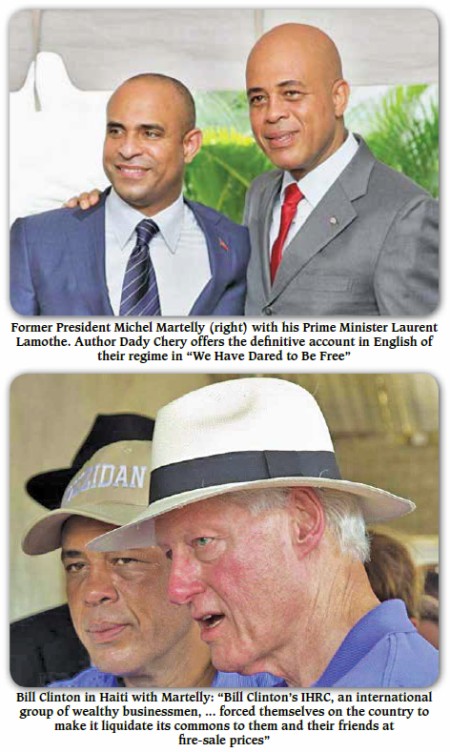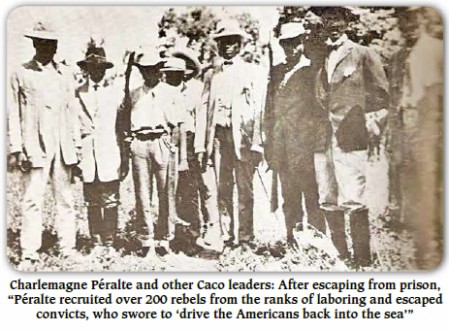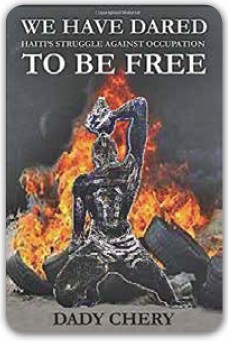|
 Every definable chapter of recent Haitian history seems
to have one book which becomes the definitive reference
for English speakers. Amy Wilentz’s “The Rainy Season” (1986-1989), Peter Hallward’s “Damming
the Flood” (2000-2006), and Jonathan Katz’s “The
Big Truck That Went By” (years around the 2010
earthquake) come to mind.
All of those examples, however, were written by
foreigners. For the period of the rise and fall of
President Michel Martelly (roughly 2010 to 2015), the
definitive account at this point is surely “We
Have Dared to be Free: Haiti’s Struggle Against
Occupation” (News Junkie Post Press, 2015), written
by Haitian scientist turned journalist Dady Chery.
But the book is much more than a recapitulation
and analysis of government malfeasance and popular
resistance during the years of the recently departed
Martelly regime. It is a stirring and unflinching
indictment of world capitalism, presented through the
prism of the Haitian history, traditions, and culture.
It leaps from macro to micro and back, through a
patchwork of personal reminiscences, interviews,
scientific explanations, and historical accounts which
illuminate, not just Haiti, but the state of the world
today.
“We can visualize a world where Haiti’s
revolution has expanded to all of humanity and become a
final push for the birth of all humans into their full
potential, and more than anything, into a respect for
the other that borders on a religion, with the
understanding that we are part of all the life that
makes up this era on Earth,” Chery writes in a
tour-de-force introduction. “Haiti’s example of the
first successful anti-capitalist, anti-imperial, and
anti-colonial revolution in a world where slavery was in
vogue, showed what humans could do in the face of
impossible odds.”
Throughout the book, the author, proud of her
“magical childhood” in the Haitian countryside, argues
that, in many ways, Haiti offers a model of how the
human race can survive in the face of the ecological and
economic tsunamis on the horizon. “In addition to a
categorical rejection of racism, at the base of all
Haitian conduct was also a rejection of slavery: the
philosophy that one does not live to work, but one works
to earn enough to celebrate life by developing one’s
talents,” she writes. “Such an idea is contrary to the
capitalist notion of ever growing consumption that
follows the failing model of endless economic growth.”
As the title suggests, the author carefully
catalogues the crimes of the on-going 12 year United
Nations military occupation known as the UN Mission to
Stabilize Haiti or MINUSTAH, including “gunrunning,
trading food for sex, cholera contamination, human
trafficking, child prostitution, rape, murders, and
massacres.”
She also lays out the role of the Clintons,
particularly Bill Clinton as the co-chair of the Interim
Haiti Recovery Commission (IHRC). “From the start, Bill
Clinton’s IHRC, an international group of wealthy
businessmen, backed by an expanded army from MINUSTAH,
forced themselves on the country to make it liquidate
its commons to them and their friends at fire-sale
prices,” Chery writes. She details the popular
resistance to the IHRC and an associated State of
Emergency Law “which allowed a takeover of Haiti’s
reconstruction efforts formally for 18 months in
principle, but really for as long as possible, by a
group of wealthy foreign donors who would operate
without any liability for their actions.”
Chery is a college biology professor in the U.S.,
and throughout “We
Have Dared to be Free” are detailed scientific
presentations on a host of matters: climate change,
Haiti’s cholera epidemic and its solution (sanitation,
not vaccines), the kidnapping of Haiti’s endangered
wildlife species, gold mining, etc.
The structure of the book is unconventional.
Rather than the customary recitation of Haitian history
at the book’s beginning, Chery places her detailed
treatment of key episodes in Haiti’s story towards the
middle and the end. Chapter 11 gives an in-depth
explanation of rebel leader Charlemagne Péralte and the
Caco guerillas who fought the 1915-1934 U.S. Marine
occupation of Haiti, and Chapter 21 (of 23 total) gives
a similarly detailed account and analysis of Toussaint
L’Ouverture, the leader of the successful slave
revolution in the colony of St. Domingue.
Chery also slaughters many sacred cows. I
particularly liked her spirited defense of the
institution of
restavek, which is often presented by North American
liberals as child slavery. “One cannot talk about
orphaned Haitian children without confronting two highly
controversial and interwoven subjects:
Vodou and
restavek,”
Chery writes. “Both are part of the very fabric of the
Haitian family, which is currently under vicious
attack.”
Chery’s mother had been a
restavek in
her grandparents’ home, and she relates many anecdotes
to argue that the “restavek
system is profoundly subversive in that it intimately
binds Haitians of different socioeconomic classes.”
Similarly, the author makes a clear explanation
and strong defense of vodou: “The practices of Haitian
Vodou represent religion, unadulterated, unappropriated,
and at its best: not an infantilizing force that
habituates people to their prostration before a greater
power, but a cultural force that anchors people in the
lands and waters around them and furnishes them with the
practices for a joyful, sustainable life.”
Many parts of the book are drawn from the
author’s Haiti Chery blog (www.dadychery.org),
such as her detailed review of the Martelly government’s
unilateral attempts to transform the bucolic Ile à Vache
(Cow Island), just off Aux Cayes, into a tourist
complex, without consulting with the island’s
population. The author interviewed the leaders of the
resistance that emerged and explains why and how the
take-over foundered.
Chery takes to task some progressive U.S.
journalists and intellectuals, charging them with being
“high priests of journalism” who “promote the neoliberal
agenda and encapsulate their disinformation in
reasonable seeming and progressive-sounding language.”
In her zeal to defend Haiti against the undeniable
“propaganda war” and “disinformation campaign” waged
against it, Chery may be blasting writers who are not
the enemy, a little like an overactive immune system
causes an allergic response. There surely is historical
confusion, factual sloppiness, formulaic reasoning, and
idolatry
in some “leftist” writings on Haiti, and Chery’s
indignation will make any well-meaning writer deeply
reflect on whether their arguments do not bring water to
neoliberalism’s mill in Haiti.
Similarly, Chery critiques “supposedly leftist
governments like those of Ecuador, Argentina, Bolivia,
Uruguay and Venezuela [which] have also eagerly
supported the [Martelly] regime under the pretext that
they would not wish to abandon Haiti to the U.S..” She
should have noted, however, that Venezuela, for one,
never joined MINUSTAH. Furthermore, officials from both
the governments of the late Hugo Chavez and Nicolas
Maduro have always defended their dealings with Martelly
by saying that they would honor Venezuela’s commitments
to the Haitian people (made under President René Préval)
whether they liked Haiti’s political representatives or
not, a principled approach with contrasts sharply with
that of Washington.
There are quite a few detours in
“We Have Dared to
be Free.” Chery goes into great depth on the 2010
coup d’état attempt in Ecuador, on how a warming planet
causes stronger storms and what damage they have caused
worldwide, and on the history and tactics of Martin
Luther King, Jr.
But all these detours lead back to her central
and often revisited central thesis: “The systematic
destruction of Haiti, if it is allowed to continue, will
not be Haiti’s loss alone. Gone will be a cheerful and
sustainable way of life, the taste for being sated with
enough, which we must all learn to recover for the sake
of our species’ survival.”
As Chery also notes in her introduction: “If
Haiti is a model of the world’s depredations, it is also
a testament to human resistance.”
Haiti’s 2010 earthquake awakened the engaged journalist
lying dormant in a biology professor simply pursuing her
career. “We Have
Dared to be Free” is the result, a passionate and
scientific argument for how Haiti still offers humanity
an example to be followed.
|